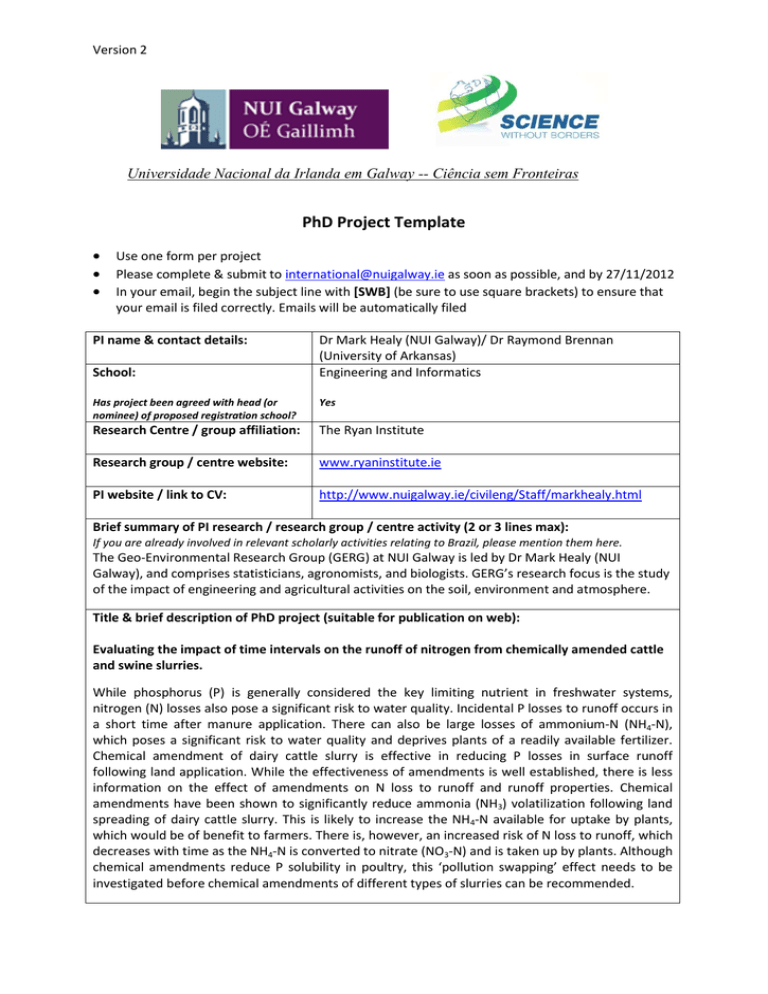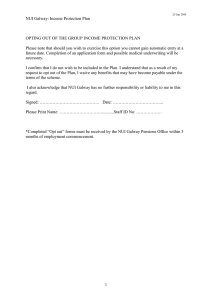PhD Project Template
advertisement

Version 2 Universidade Nacional da Irlanda em Galway -- Ciência sem Fronteiras PhD Project Template Use one form per project Please complete & submit to international@nuigalway.ie as soon as possible, and by 27/11/2012 In your email, begin the subject line with [SWB] (be sure to use square brackets) to ensure that your email is filed correctly. Emails will be automatically filed PI name & contact details: School: Dr Mark Healy (NUI Galway)/ Dr Raymond Brennan (University of Arkansas) Engineering and Informatics Has project been agreed with head (or nominee) of proposed registration school? Yes Research Centre / group affiliation: The Ryan Institute Research group / centre website: www.ryaninstitute.ie PI website / link to CV: http://www.nuigalway.ie/civileng/Staff/markhealy.html Brief summary of PI research / research group / centre activity (2 or 3 lines max): If you are already involved in relevant scholarly activities relating to Brazil, please mention them here. The Geo-Environmental Research Group (GERG) at NUI Galway is led by Dr Mark Healy (NUI Galway), and comprises statisticians, agronomists, and biologists. GERG’s research focus is the study of the impact of engineering and agricultural activities on the soil, environment and atmosphere. Title & brief description of PhD project (suitable for publication on web): Evaluating the impact of time intervals on the runoff of nitrogen from chemically amended cattle and swine slurries. While phosphorus (P) is generally considered the key limiting nutrient in freshwater systems, nitrogen (N) losses also pose a significant risk to water quality. Incidental P losses to runoff occurs in a short time after manure application. There can also be large losses of ammonium-N (NH4-N), which poses a significant risk to water quality and deprives plants of a readily available fertilizer. Chemical amendment of dairy cattle slurry is effective in reducing P losses in surface runoff following land application. While the effectiveness of amendments is well established, there is less information on the effect of amendments on N loss to runoff and runoff properties. Chemical amendments have been shown to significantly reduce ammonia (NH3) volatilization following land spreading of dairy cattle slurry. This is likely to increase the NH4-N available for uptake by plants, which would be of benefit to farmers. There is, however, an increased risk of N loss to runoff, which decreases with time as the NH4-N is converted to nitrate (NO3-N) and is taken up by plants. Although chemical amendments reduce P solubility in poultry, this ‘pollution swapping’ effect needs to be investigated before chemical amendments of different types of slurries can be recommended. Version 2 Universidade Nacional da Irlanda em Galway -- Ciência sem Fronteiras Therefore, the aim of this study is to investigate the N loss pathways following landspreading of chemically amended slurries (dairy, pig, poultry) and specifically to investigate how these N loss pathways may change from the time of application. These tests will involve examining the impact of various rainfall intervals on surface runoff, and greenhouse gas and NH3 emissions. Tasks involved: Working as part of a research team. Literature search. Characterisation of wastewater. Application of wastewater to soil in rainfall simulator runoff boxes, and measurement of surface runoff of nutrients and solids, and greenhouse gases. Unique selling points of PhD project in NUI Galway: NUI Galway projects should emphasise features that are not typically available in Brazil – specific equipment, multi-disciplinarity, aspects of structured programme, links with industry, placements, links with other research groups etc. This project would allow the successful candidate the opportunity to work as part a multidisciplinary group within NUI Galway’s environmental engineering facility, which has links in Australia, USA, Finland, France, the UK, and Brazil. The Civil and Environmental Engineering Laboratory, constructed in 2011 at NUI Galway, is a state-of-the-art laboratory and is amongst the most pre-eminent laboratories of its type in Ireland. It is located in the largest engineering building in Ireland. The laboratory has state-of-the-art environmental water quality measurement, microbiological, and gas measurement facilities. GERG is also closely affiliated with Teagasc, Johnstown Castle, which is Ireland’s leading research institute on the rural environment, and which conducts both fundamental and applied research on a wide range of subjects, e.g. nutrient efficiency, water quality. Name & contact details for project queries, if different from PI named above: Please indicate the graduates of which disciplines that should apply: Graduates with a background in Civil/Environmental Engineering, or any natural science subject (geology, chemistry, hydrogeology) should apply. Training will be provided by the project supervisor. Ciência sem Fronteiras / Science Without Borders Priority Area: Please indicate the specific programme priority area under which the proposed PhD project fits- choose only one (tick box): Engineering and other technological areas x Please indicate which of the following applies to this project (referring to Science Without Borders arrangements): Suitable only as a Full PhD (Y/N): _ _Y_ Available to candidates seeking a Sandwich PhD arrangement (Y/N): _Y__ Suitable for either: __Y__

